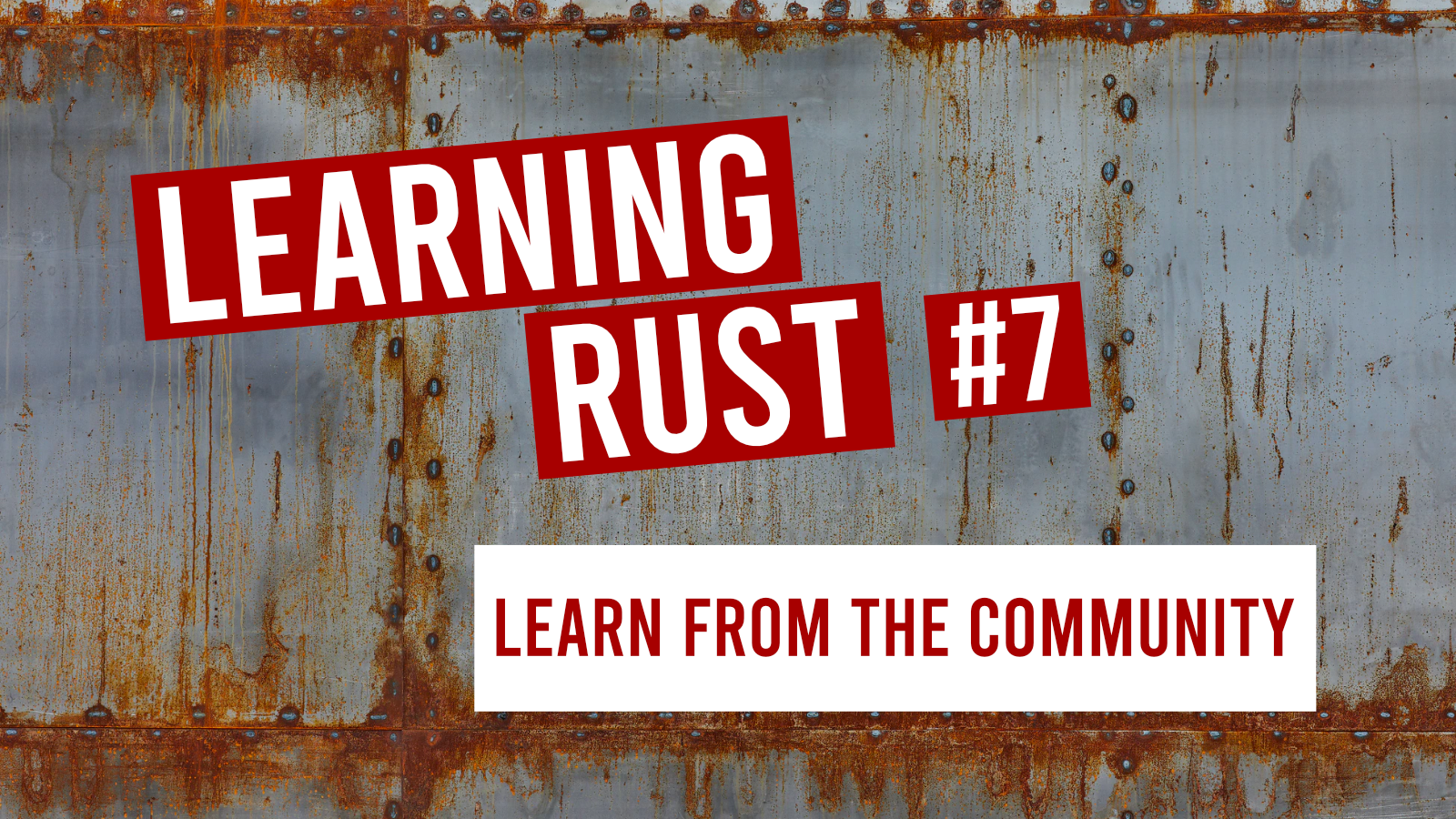Learning Rust #7: Learn from the community

Last December I finally started learning Rust and in January I built and published my first app with Rust: 235. Learning Rust is my monthly blog series that is defnitely not a tutorial but rather a place for me to keep track of my learning and write about things I've learned along the way.
Learning Rust series
- Learning Rust #1: Pattern Matching
- Learning Rust #2: Option & Result
- Learning Rust #3: crates.io & publishing your package
- Learning Rust #4: Parsing JSON with strong types
- Learning Rust #5: Rustlings
- Learning Rust #6: Understanding ownership in Rust
- Learning Rust #7: Learn from the community (you are here)
- Learning Rust #8: What's next?
- Learning Rust #9: A talk about rustlings
- Learning Rust #10: Added new feature with a HashMap
One of the original reasons I got excited to start learning Rust was the community I saw form around it. As I've mentioned before multiple times, I've been mostly working with Javascript and Python and spending time in those communities but still, Rust has been popping up on my radar constantly. Whether it's been conference and meetup talks, blog posts or general excitement about the language and its ecosystem in Twitter, there was always something that caught my attention.
In this blog post, I want to share some of the resources that I've found very helpful in my learning journey.
This Week in Rust
The number one place for me to stay up to date and find new blog posts, articles and videos about Rust is the This Week in Rust newsletter. It's a weekly newsletter (you can either subscribe to it via email or via RSS or just read it on the website) with a ton of links to community resources.
Each week, you'll have more stuff to read and watch than you probably have time to. I often browse through the headlines, save interesting ones to Pocket and read them whenever I have extra time.
If you're a reader of this blog series, it's also very likely you've found your way to these blog posts earlier through this newsletter as it's been the single largest contributor to my website visits.
In Twitter, the hashtag #rustlang is a great way to find tweets and to participate in the discussion. I've gotten to know a lot of great rustaceans through sharing and participating in #rustlang discussion. My experience with the community in Twitter has been really great.
If you wanna follow some accounts, here are some I'm always delighted by:
- @rustlang, the official Rust language account that also retweets a lot of Rust posts
- @ThisWeekInRust, the account for the aforementioned newsletter
- @CecileTonglet, a rustacean from who I've learned so much through her Tweets and sharing of her own development
- @nellshamrell, the board director of the Rust Foundation
- @timClicks, the author of Rust in Action book, blogger and educator
- @m_ou_se, the Rust Library team lead
- @Brooks_Patton, streams Rust development, runs Denver Rust meetup
- @rust_foundation, the Twitter account of Rust Foundation (as is the foundation) is still quite young so I don't know exactly what they'll share but I assume it'll be a good way to stay up to date what happens with them
Video stuff
There are also great ways to learn in video format, whether it's Youtube/Twitch style content or event talk recordings. Here are some starting points:
- Rust @ Youtube, curated videos by the Rust team, including conference talks, RFC team videos, and others
- RustLab Conference @ Youtube, an Italian Rust conference channel with also some remote meetup style sessions recently
- Brooks Patton @ Twitch, regular live streams of building software with Rust
- Rust Denver playlist @ Youtube, Rust Denver meetup recordings
- TimClicks @ Youtube, Rust videos by Tim McNamara
- Let's Get Rusty @ Youtube, weekly bite-sized Rust videos
Rust online & offline communities
There are several places online for rustaceans to hang out like Users Forum, Internals Forum, and Discord Server. There are also many local Rust meetups you can find from the calendar or Meetup.com.
I've also found great help and people to chat with from non-specific groups like with my colleagues or the Finnish Koodiklinikka community. So if you're involved in any general tech communities like those, take a look if there's a group for rustaceans – or maybe start one.
What did I miss?
I'm always looking to expand my network of sources to learn more. Let me know in Twitter if you have good suggestions!
Recommendations from other people:
- Dmitry Dugalo's 3-part series on using Rust with Python (recommended by Benjamin Balder Bach)
- Amos's blog posts on Rust (recommended by Dmitry Dugalo)
- Streaming Rust with Ryan Levick (recommended by Dmitry Dugalo)
- Jon Gjengset (Youtube) (recommended by Dmitry Dugalo)